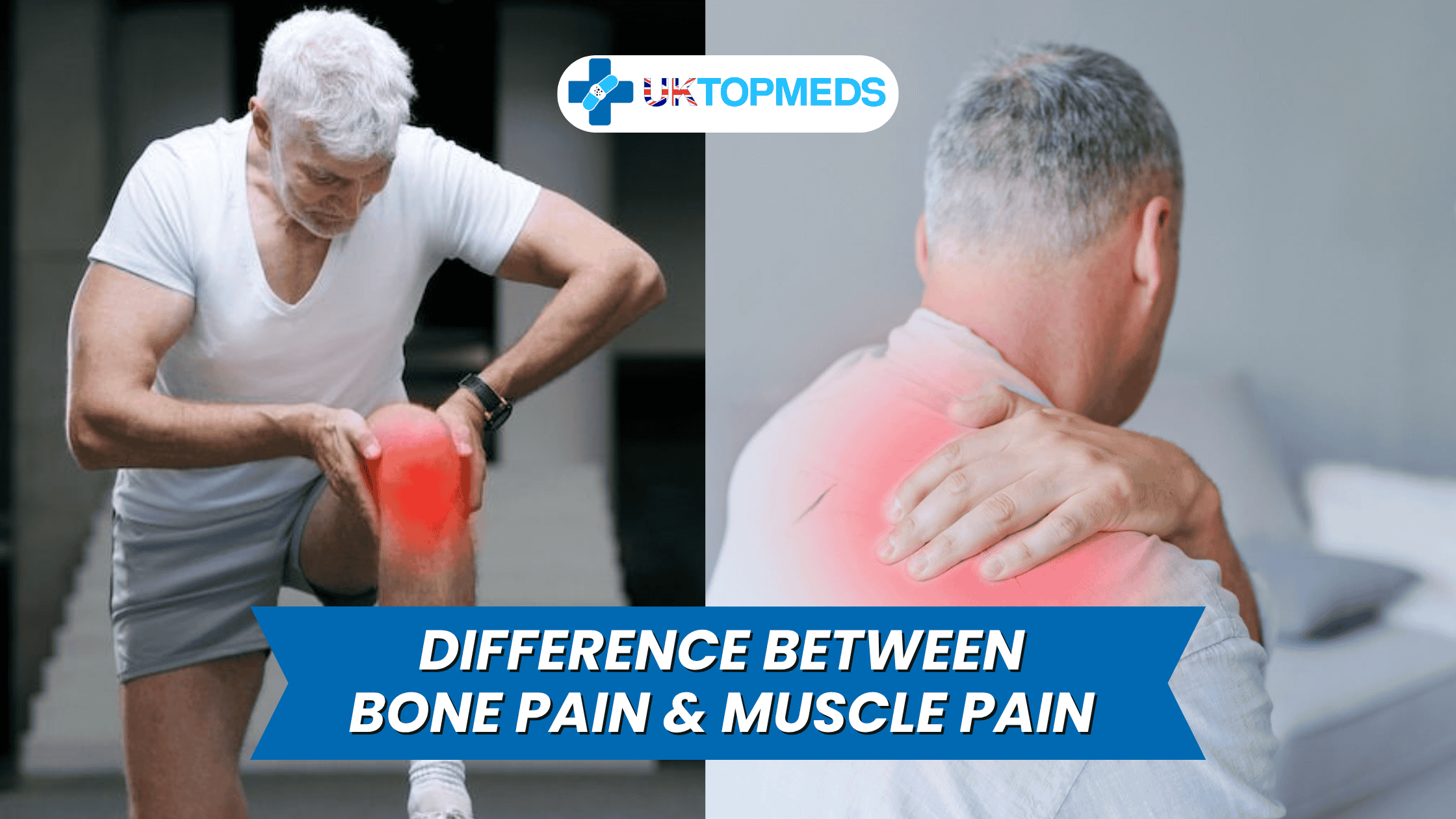No products in the cart.
You dont have any products in your cart yet, add a few products to experience this experience.
What’s the Difference Between Bone Pain and Muscle Pain?

Bone pain is localised, deep and sharp, while muscle pain is a widespread soreness along the length of the muscle. Bone pain is easier to spot and feels more intense. Muscle pain is a general, dull ache caused by minor injury, strain, or overuse. Bone ache is present whether you move or not, while muscle pain worsens with movement or when you use the affected muscle. Pain in any part of the body profoundly impacts your life functions. Talk to your healthcare provider in case of severity of pain and prevent further damage.
Body aches in any part, whether mild or moderate, should not be ignored. You can alleviate pain by being proactive and vigilant toward your physical health. However, it may be challenging to differentiate between different types of pain. This blog elaborates on the difference between bone pain and muscle pain, their causes, and how to treat them.
Comparison Between Bone Pain and Muscle Pain
| Feature | Bone Pain | Muscle Pain |
| Sensation | Deep, intense pain, often constant | Dull, cramping, or throbbing |
| Location | Diagnosed at a specific point | Generalised, spread along a large area |
| Movement | Feels pain even when you are not moving | May increase with movement |
| Causes | Fracture, bone infection, arthritis, bone cancer | Strain, minor muscle injuries, overuse |
| Recovery | Rest and medication | Rest, ice, and stretching |
Causes of Bone Pain
Many reasons can cause joint pain and muscle pain. It may come from an injury, overuse, or health issues like arthritis and fibromyalgia. Sometimes, infections, nerve problems, or vitamin deficiencies also play a role. Even conditions like osteoporosis or, in rare cases, leukaemia can cause pain.
Common Causes of Bone Pain
Injuries: Falls, accidents, or sports can lead to broken bones, sprains, or long-term wear and tear on joints and muscles.
Overuse and posture: Repeating the same movements or sitting poorly for long hours can strain muscles and joints, leading to pain.
Arthritis: Diseases like osteoarthritis or rheumatoid arthritis cause inflammation, stiffness, and swelling in the joints.
Fibromyalgia: A long-term condition that causes constant pain and tenderness in the muscles, tendons, and ligaments.
Infections: Certain infections can affect the bones or muscles and lead to pain and swelling.
Nerve compression: When nerves are pressed or pinched, as in sciatica or carpal tunnel, it can cause sharp or burning pain.
Less Common Causes
Less common causes of bone pain include:
Osteoporosis: Weak bones that break easily can cause pain and discomfort.
Nutritional deficiencies: Low vitamin D or calcium can make bones weak and sore.
Medical conditions: Diseases like lupus or, in rare cases, leukaemia may cause bone or muscle pain.
Other conditions: Issues like gout or bursitis can also trigger joint and bone pain.
Whatever the cause of your bone pain may be, strong painkillers are available to help you get rid of the pain. Talking to your doctor or pharmacist is also advisable in order to get the most effective medication for your case.
Causes of Muscle Pain
Muscle pain may happen for many reasons. It may be mild and temporary or part of a larger health issue. Some of the most common causes of muscle pain include.
Strains: Stretching a muscle or tendon too far during sports, sudden movements, or falls can cause muscle aches and stiffness.
Injury or trauma: A strong impact or bruise can make muscles sore, swollen, and tender to the touch.
Overexertion: Working out too hard or standing for long hours can leave muscles tired and achy for a few days.
Stress: Mental or physical stress causes muscles to tense up, especially in the neck, shoulders, and back, leading to pain.
Dehydration: Not drinking enough water can cause cramps and soreness, especially after physical activity.
Poor posture: Sitting or standing incorrectly for long periods strains the muscles and leads to discomfort.
Lack of sleep: When the body doesn’t rest well, muscles don’t recover properly, causing pain or weakness.
Nutritional deficiencies: Low vitamin D or iron levels can cause muscle weakness or soreness.
Infections or diseases: Flu, pneumonia, fibromyalgia, or arthritis can cause widespread body or muscle pain.
If muscle pain lasts a long time or affects your daily life, it’s best to see a doctor for proper evaluation.
Managing Bone Pain and Muscle Pain
Treating bone and muscle pain depends on the cause and severity, and needs targeted strategies:
Addressing Bone Pain
Bone pain is often caused by fractures or osteoporosis. The treatment method is based on the cause of pain and can include:
Supplements for bone health: Vitamin D and calcium enhance bone strength and reduce the risk of bone fracture.
Pain management: NSAIDs (over-the-counter nonsteroidal anti-inflammatory drugs) help relieve mild to moderate pain, while you may need to get recommended medications in order to deal with severe cases.
Surgical interventions: One may need surgery for joint damage or severe fractures.
On rare occasions, when bone pain is caused by a more serious condition, like cancer or infection, it’s important to seek medical care. It will help find the underlying issue and treat it accordingly.
Fixing Muscle Pain
It is comparatively easier to manage muscle pain at home. The right care and treatment depend on the cause of the pain. Here are some effective remedies:
Rest and ice: Give time for recovery and rub ice to mitigate inflammation.
Anti-inflammatory medicines: NSAIDs can reduce pain and inflammation.
Stretching and massage: Gentle stretching prevents stiffness, while massage relieves knots.
Heat therapy: Heat improves blood circulation and relaxes stiff muscles.
Hydration and electrolytes: Drinking more water helps prevent muscle cramps.
Physical therapy: A customised physical therapy program can empower muscles, enhance flexibility, and stop future injuries.
Taking a comprehensive approach can result in effective relief and encourage long-term musculoskeletal pain relief.
When to Seek Medical Advice?
Pain may be reduced using painkillers like Gabapentin, Pregabalin, or Tramadol at home. If home remedies for your pain are not making a difference, it’s time to see your doctor. If you are not aware of the cause of pain, or if it is persistent and severe, talk to your doctor for careful diagnosis and treatment. You should also consult your healthcare professional if you notice other symptoms like swelling, loss of function, or fever.
FAQs
How do I know if it’s bone pain or muscle pain?
Bone pain usually feels deep, sharp, or constant, even when you rest. Muscle pain tends to be dull, achy, and worse when you move or press the area. Buy verified painkillers online after consulting your doctor and resolve your health issue.
What diseases make your bones hurt?
Conditions like arthritis, osteoporosis, infections, and sometimes cancer, such as leukaemia, can make your bones ache. Vitamin D deficiency can also cause bone pain.
How to buy painkillers online for muscle and bone pain?
Buy painkillers online from a verified and registered pharmacy, UKTopMeds. Visit our product page, find your product, and book your order. Get ready to receive it within 1-2 working days.
What other painkillers are available online in the UK?
UKTopMeds provides a wide variety of trusted and tested painkillers online, such as Co-codamol 30/500mg, Codeine Phosphate 30mg, Dihydrocodeine 30mg, Tramadol 100MG, Tramadol 50MG, Pregabalin 300mg Capsules hard, and Gabapentin 300mg.
How to differentiate between muscle pain and bone pain?
Muscle pain often changes with movement or pressure, while bone pain stays steady and feels deeper. Bone pain can also be linked to swelling or tenderness over the bone.
How to tell if pain is muscular?
Muscle pain feels sore, tender, or tight and usually gets worse when you move. It often improves with rest, stretching, or a gentle massage.
Conclusion
After having comprehensive knowledge of the differences and causes of bone pain and muscle pain, you can easily differentiate between the two. However, seeking medical advice is essential if you experience bone or muscle pain that seems to persist. With early medical attention and immediate care, you can lessen the chances of long-term effects and recover your quality of life.

Alex Rivera
Alex Rivera is a Doctor of Pharmacy and a clinical researcher with over 15 years of experience in drug development and pharmacology. His work focuses on the efficacy and safety of new medications, and his articles provide in-depth analysis on drug interactions, side effects, and pharmaceutical innovations. Michael is committed to promoting medication safety and patient-centric care.



